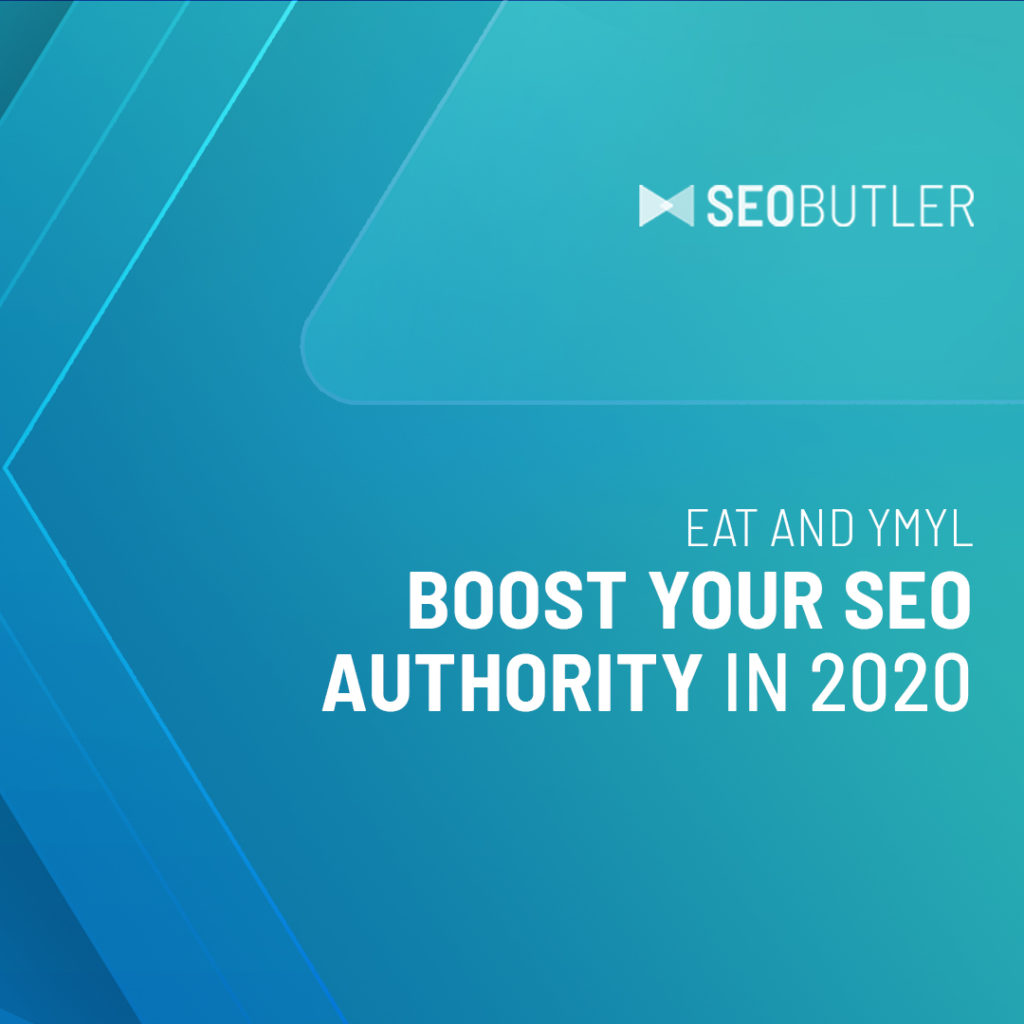EAT and YMYL – Boost Your SEO Authority in 2020

Google updates its search algorithms ceaselessly.
SEO techniques become outdated quickly.
With the rapid evolution of Google algorithms, it’s recommended to leave many of the old SEO techniques — such as PBNs — behind.
It’s becoming harder and harder to outsmart the artificial intelligence and machine learning technology deployed by Google — which has a virtually limitless budget.
If you want to get serious about SEO — and aim to create websites that are profitable in the future — you must keep yourself up-to-date regarding the developments taking place in the Google search algorithms.
Post-BERT, Expertise, Authority, and Trust (EAT) are three crucial elements with a significant impact on search rankings.
Let’s take a look at how to boost your SEO with EAT in 2020.
All You Need to Know About EAT and YMYL
As mentioned above, EAT represents Expertise, Authority, and Trust.
These three metrics are used by Google to quantify whether a website is a leader in its respective niche.
Expertise
Is your content being created by subject matter experts?
Experts are people with the required understanding and knowledge related to the specific field that can discuss the topic in-depth.
The knowledge could be specialized or general.
Google also accepts “everyday expertise.”
What exactly does this term mean?
Some topics may not require a lot of subject matter expertise.
Many people write in-depth reviews related to products or restaurants that can be very helpful.
A lot of them also share their experiences and tips on their blogs or various forums.
If a person has life experience related to the content he or she creates, that experience may make them an expert on the topic.
Google considers this to be everyday expertise and the person or website shouldn’t be penalized in search results for lacking a “formal” education in many instances.
Google seeks to rank websites that have published content that is helpful, useful, relevant, comprehensive, and accurate higher in the SERPs.
In specific niche areas (for instance, finance, medical or legal), it is vital to demonstrate your expertise.
People visit your website to get answers to crucial questions and offering inaccurate or outdated content can potentially be disastrous.
Google works hard not to send users to content that is incorrect or websites that deliberately mislead users.
So, you must ensure that the people who create the content for your website have the required expertise in the subject matter.
Also, check the accuracy of any content before you hit publish.
Authority
Google has used PageRank to evaluate authoritativeness right from the start.
PageRank indicates that external backlinks are one of the top signals of authoritativeness.
When it comes to backlinks, the quality of the links is a top-ranking factor.
For years now, we’ve heard links compared to votes.
The more votes — links — your site or webpage has, the more popular/authoritative it is.
Expertise means possessing the required knowledge and skills, whereas authority is recognition of that proficiency by others both within and outside of your industry.
This recognition can take the form of shares, links, mentions, reviews, or any other citation.
Creating useful content is the best way to build authority.
Trustworthiness
It takes a lot of hard work to earn the trust of both the search engines and the public.
People must be able to trust your business or brand and be willing to buy from and endorse you.
By highlighting your content creator’s credentials as well as that of your website, you can improve the level of trust.
Other factors that can contribute to trustworthiness include testimonials, awards, endorsements, etc.
Checking Your EAT Score
In addition to checking the domain authority, you can check your EAT rank by the ratio of favorable to negative reviews, bounce rate, social media impressions, the number of search queries related to the brand, and more.
Unfortunately, there isn’t just one tool to check your EAT ranking.
You must check your performance in every category.
YMYL
YMYL refers to Your Money or Your Life.
YMYL pages consist of information that might have a significant impact on a user’s wallet or wellbeing.
Think WebMD or eTrade.
Categories that can fall under YMYL include:
- Health and medical advice
- Financial advice
- News and current events
- Government or legal-related topics
Not surprisingly, Google holds YMYL pages to higher standards of EAT.
Surfacing YMYL pages with incorrect or misleading information can have extremely adverse effects on consumers.
According to Section 2.3 of the Search Quality Guidelines of Google, YMYL pages have a potential impact on the happiness, wealth, or health of users.
Google emphasizes the requirement to get recognized and identified by Google as an high-EAT voice in the respective niche.
Google works with over 10,000 search quality raters worldwide.
Raters work with real search queries and evaluate how accurate and useful Google’s SERP results are.
Raters also evaluate the impact of search algorithm updates and verify if the changes are functioning as they should.
In short, raters help ensure that pages that demonstrate EAT, as well as meeting YMYL requirements, are ranked higher.
Search quality raters help determine your EAT score, and this can have a direct effect on your rankings in the SERPs.
To boost EAT as well as SEO ranking:
- You must update your content regularly
- Your website has to be well-designed
- You have to ensure that every page has useful/authoritative content
- Link out to various other experts
- Offer valuable and trustworthy advice
- Publish the bio and contact details of your author
- Create pages on single subjects
EAT and YMYL are indicators of the quality of your content.
Improve Your Content to boost your EAT and YMYL Scores
To enhance the quality of your website content, you need content written by a professional who does the necessary research and writes well.
Give some thought as to what makes a person trust a particular page: make use of the author’s credentials, cite research from reputable high-EAT sources, and provide author contact details.
Here are a few additional points to be considered if you’re keen on improving the quality of your content and EAT or YMYL scores:
- Audit your website to ensure that the design and content demonstrate expertise, authority, and trust.
- Make sure an author’s bio is included in every post, along with a byline. This helps demonstrate expertise and authority in the content.
- Ensure that there is no plagiarism or duplicate content.
- Include an up-to-date “About Us” page, which enables the Search Quality Raters of Google to learn more about you and your reasons for writing content in a specific niche.
- The quality of your backlink profile is crucial to determining your EAT as well as YMYL scores.
- Ensure that visitors can easily contact you through a Contact Menu on your website.
Why are YMYL and EAT Crucial for SEO?
YMYL, EAT, as well as SEO, are all interconnected.
The EAT guidelines were created by Google to help websites generate valuable and high-quality content.
When a YMYL website follows the EAT standards, the site is assumed to be trustworthy in the eyes of Google.
Building EAT enables your website to rank higher in the SERPs, reach the right audience, get more traffic, and also generate more conversions.
If your business qualifies as a trusted YMYL website, you can reasobly expect more organic traffic.
Final Thoughts
If your EAT and YMYL scores improve, it becomes much easier to reap the rewards of professional SEO, and attain a better ranking in Google’s SERPs.
Pay heed to the critical SEO principles of EAT and YMYL and boost your SEO in 2020.
[cta]
[author_bio image=”https://seobutler.com/wp-content/uploads/2020/01/Jitendra-Viswani-Circle-e1579604441807.png” name=”JITENDRA VASWANI”]Jitendra Vaswani is a Digital Marketing Practitioner and international keynote speaker, currently living the digital nomad lifestyle. He is the founder of Internet Marketing blog BloggersIdeas where he interviewed marketing legends like Neil Patel and Rand Fishkin. During his 6+ years in Digital Marketing, Jitendra has been a marketing consultant, trainer, speaker, and author of “Inside A Hustler’s Brain : In Pursuit of Financial Freedom” which has sold over 20,000 copies, worldwide.[/author_bio]

